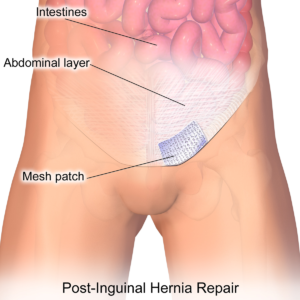 Inguinal hernias in the groin are commonly repaired using surgical mesh patches or plugs. This reduces the risk of the hernia returning, but increases the risk of mesh-related complications like chronic pain, infection, adhesions, organ damage, mesh erosion or migration, and surgery.
Inguinal hernias in the groin are commonly repaired using surgical mesh patches or plugs. This reduces the risk of the hernia returning, but increases the risk of mesh-related complications like chronic pain, infection, adhesions, organ damage, mesh erosion or migration, and surgery.
Do I have a Hernia Mesh Patch Lawsuit? If you or a loved one was diagnosed with a surgery complication from an inguinal hernia repair using mesh, contact our law firm immediately for a free case consultation. If you file a lawsuit, you could receive compensation for your injury, medical expenses, and more.
What is an Inguinal Hernia?
Inguinal hernias in the groin are the most common type of hernia. They occur when the intestines, bladder, or fatty tissue pushes through a weak spot in the thin wall of muscles in the lower abdomen.
Types of Groin Hernias
There are two types of inguinal hernias. By far the most common are indirect hernias, mostly present from birth as a congenital condition in boys. The other type is a direct hernia, mostly seen in adult men due to naturally weakened tissues as a result of aging or lifestyle. Another uncommon type of groin hernia is the femoral hernia.
Symptoms of a Groin Hernia
Inguinal hernias are located just above the crease between the lower abdomen and thigh. They can occur on one side or both sides of the groin. About two-thirds of groin hernias cause symptoms, which may include:
- Soft or hard bulge
- Bulge may disappear when lying down
- Discomfort in the groin, pelvis, or testicles
- Pain when straining, lifting, coughing, or exercising
- Feeling weakness, heaviness, burning, or aching in the groin
- Swollen or enlarged scrotum in men or boys
Strangulated Hernias
Indirect inguinal hernias have a higher risk of serious complications than direct inguinal hernias because they are more likely to contain intestines or the bladder rather than fat.
If the hernia cannot be pushed back into the abdomen while laying down, it may be stuck in the abdominal wall. This can lead to a life-threatening “strangulated hernia,” in which the blood-flow is cut off to the intestines or bladder inside the hernia. It can be deadly without emergency surgery.
What is the Risk?
Men are 8-times more likely to develop an inguinal hernia than women. About 23% of men and 3% of women develop a groin hernia at some time in their life. About 96% of all groin hernias are inguinal hernias, and the rest are femoral hernias.
Why Are Groin Hernias So Common in Men?
Shortly before birth, testicles descend through a hole in the inguinal canal into the scrotum. This hole normally closes within a few weeks of birth. If it does not, intestines or fatty tissue can slide into the inguinal canal and cause an “indirect inguinal hernia.” They occur in 2-3% of male children and are more common in premature babies.
Risk-Factors for Inguinal Hernias
- Heavy lifting
- Chronic sneezing or coughing
- Chronic constipation
- Straining to urinate due to enlarged prostate
- Obesity or being overweight
- Fluid in the abdomen (ascites)
- Family history
Tests & Diagnosis
Groin hernias are mostly diagnosed during a physical exam by a doctor. Sometimes diagnosis is challenging in newborns or people who are very overweight. Other medical conditions that cause swelling may look like a hernia. If there is any doubt, imaging tests like an ultrasound, CT scan, or abdominal X-ray can help make a conclusive diagnosis.
Surgical Treatment
Inguinal hernias do not go away on their own and the only treatment is surgery. However, a “watch and wait” approach is usually preferred for hernias that are not growing larger or causing symptoms. More than 1 million hernia repair surgeries are performed in the U.S. every year, and 800,000 involve inguinal hernias.
Inguinal Hernia Repair & Surgical Mesh
Inguinal hernia surgery can be performed with minimally-invasive (laparoscopic) or open techniques. In both cases, the patient is anesthetized and the surgeon gently pushes organs back inside the abdomen. The hole is closed with stitches. In some cases, surgical mesh or a plug is patched under the hole to reinforce the area. Hernia mesh helps stop the hernia from returning, but increases risk of long-term side effects.
Do I have a Hernia Mesh Patch Lawsuit?
The Defective Medical Device Litigation Group at our law firm is an experienced team of trial lawyers that focus on the representation of plaintiffs. We are handling individual litigation nationwide and currently accepting new cases in all 50 states.
Free Hernia Mesh Patch Lawsuit Evaluation: Again, if you or a loved one was diagnosed with a serious complication from an inguinal hernia repair using mesh, you should contact our law firm immediately. You may be entitled to compensation by filing a lawsuit, and our lawyers can help.
Attention Lawyers: Schmidt & Clark, LLP considers a referral from another lawyer to be one of the greatest compliments. Our law firm has built a reputation for success and accepts a number of case referrals on a regular basis. We do not publish prior verdicts or settlements on our website. If you would like to refer us a case or for us to send you a profile of prior award judgments or average referral fees, please fill out the form below.

